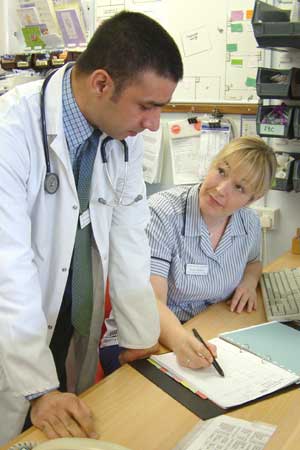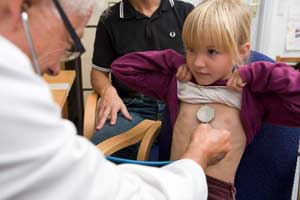General Practitioner
Tasks & duties

General practitioners may do some or all of the following:
-
consult with and examine patients
-
treat individuals and families over an extended period
-
diagnose patients' problems
-
counsel patients
-
carry out or arrange for special tests
-
advise on health care and prevention of illness
-
perform minor surgery
-
prescribe and administer medicines
-
keep medical records
-
visit patients at their homes
-
co-ordinate patient care with nursing and support staff
-
refer patients to other health services when necessary
-
fill out medical certificates for patients
-
liaise with ACC (Accident Compensation Corporation) over accident and injury claims
-
train and supervise doctors working towards their GP exams
-
advise and help patients claim for welfare benefits
-
keep up to date with medical knowledge
-
help carry out government campaigns to increase good health, using immunisation and education
Some general practitioners complement their work with other special interests such as sports and travel medicine, police work, and appearance medicine.
Specialisations
General practitioners can specialise after gaining a diploma in the relevant area. Specialisation areas include:
-
emergency medicine
-
sports medicine
-
obstetrics (childbirth)
-
geriatric medicine (working with the elderly)
-
paediatrics (working with children)
-
palliative care (lessening pain)
Skills & knowledge

General practitioners need to have:
-
communication and people skills to relate well to patients and colleagues
-
knowledge of anatomy and how the human body works
-
knowledge of different diseases and illnesses
-
knowledge of medicines and treatments and the effect these have on patients
-
knowledge of how to access community support for their patients
-
an awareness and understanding of other cultures and their attitudes to medical treatment
-
up-to-date knowledge of new research, treatments and practices
-
knowledge of medical ethics and law
-
diagnostic skills
-
analytical and interpreting skills
-
decision-making and problem-solving skills
-
organisational and time management skills
-
report writing skills
General practitioners who run their own practice may also need to have small business knowledge and skills.
Entry Requirements
To become a general practitioner you need to complete a Bachelor of Medicine and Bachelor of Surgery (MBChB), then spend at least two years working in a hospital as a junior house surgeon. After completing at least a year of intensive clinical training or participating in a seminar programme you need to sit the Primary Membership Examination (Primex), to become a Member of the Royal New Zealand College of General Practitioners (RNZCGP) .
After further training, you are awarded a Fellowship of the College (FRNZCGP), New Zealand's postgraduate qualification for general practice. This allows you to practise independently as a general practitioner.
Secondary Education
If you are thinking of studying medicine it is best to complete NCEA Level 3. Useful subjects include chemistry and physics, as well as statistics, calculus, biology and English.
Tertiary Education
To do a MBChB you need to complete the first year of a Bachelor of Health Science, or a Bachelor of Biomedical Science. Whether you are allowed to carry on to do your medical degree depends on your grades from your first year, combined with the results from a special test called the Undergraduate Medicine and Health Sciences Admission Test (UMAT). You may need to pass an interview as well.
Alternatively you can complete a degree and apply for graduate entry to the MBChB programme. Again, your score in the UMAT test is taken into consideration. You may also have to apply within a defined time frame after completing the first degree.
Some universities offer special entry quotas to students from rural areas, or to people of Māori or Pasifika origin.
Training on the job
After completing general practitioner training and becoming a Fellow of the Royal New Zealand College of General Practitioners, you are required to do the ongoing three-year Maintenance of Professional Standards (MOPS) programme while you work.
Registration
Doctors practising in this country need to be registered with the Medical Council of New Zealand. Registration follows six years of university and hospital study, and successfully completing a year working in a hospital. Registration as a general practitioner usually requires another four years of training, followed by three years in general practice.
After completing the fellowship requirements of the Royal New Zealand College of General Practitioners you can apply to the Medical Council of New Zealand to practise independently as a general practitioner.
Useful Experience
Useful experience for general practitioners includes:
-
nursing work
-
work in a pharmacy
-
hospital work
-
other health work experience in New Zealand or overseas
-
work with community groups that involves a wide variety of people
-
raising a family, as this can increase their understanding of dealing with children
Video
General Practitioner and Medical Lab Scientist
From just a job on you tube
Related courses
General Practice Medicine
Medical Science
Surgery
For more information, please refer to Career Services.
Document Actions
